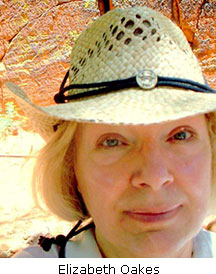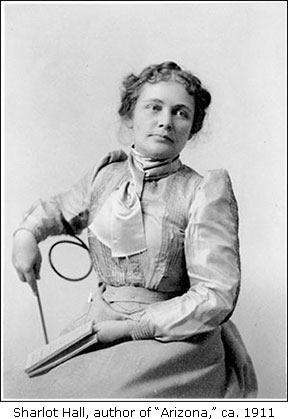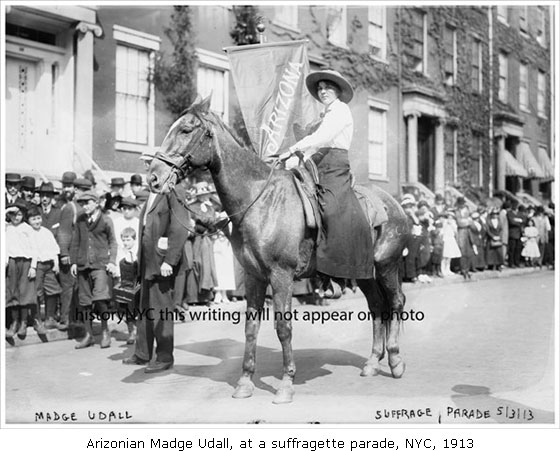Sedona Lit is a series by Dr. Elizabeth Oakes, an award winning poet and former Shakespeare professor. A Sedonian of three years, she will highlight the literature, written or performed, of Sedona, past and present.
 By Elizabeth Oakes
By Elizabeth Oakes
(November 7, 2016)
In the very early twentieth century, those living in the territory of Arizona wanted two things: they wanted to be a state, and women wanted the right to vote. Sharlot Hall’s poem “Arizona,” written in 1906, was instrumental in achieving both.
Instead of the soldier or the cowboy, she personified Arizona as a “fair-browed, queenly woman,” and that made all the difference. The poem begins with these lines:
“No beggar she in the mighty hall where her bay-crowned sisters wait,
No empty-handed pleader for the right of a free-born state;
No child, with a child’s insistence, demanding a gilded toy;
But a fair-browed, queenly woman, strong to create or destroy.”
(Note: the “bay-crowned sisters” were the current states.)
 In 1902 Congress was moving to merge the territories of Arizona and New Mexico into one state named either Montezuma or Lincoln, with the capital Santa Fe. Arizona’s economy was not developed enough, its population was too transient, it was argued. Moreover, it was lawless, with saloons that operated twenty-four hours a day!
In 1902 Congress was moving to merge the territories of Arizona and New Mexico into one state named either Montezuma or Lincoln, with the capital Santa Fe. Arizona’s economy was not developed enough, its population was too transient, it was argued. Moreover, it was lawless, with saloons that operated twenty-four hours a day!
Passionate about Arizona’s standing on her own, Hall wrote an influential article, but it was her poem that struck a chord. Arizona would be better off as a territory, she argued in the poem, even if she “had shackles on wrist and ankle and dust on her stately head.” Better to be free as a territory than to be, as she vividly described it, forced into a marriage with New Mexico.
If Arizona cannot be an independent state, she continued, then “she” will go back to her “free spaces”:
“Ay! Let her go bare-handed; bound with no grudging gift;
Back to her own free spaces where her rock-ribbed mountains lift
Their walls like a sheltering fortress – back to her house and blood.”
The Arizona Republican printed the entire poem on its editorial page and then distributed a copy to every member of Congress, resulting in its being included in the Congressional Record. Hall’s poem was recognized in its time as the strongest argument against jointure with New Mexico.
This poem is not only the main reason we live in a state called Arizona; it is also why Arizona women were among the first in the United States to vote.

When Arizona was declared a state on February 14, 1912, revelers made noise, men rang courthouse bells, and celebrants set off sticks of dynamite. However, none of the parades featured women, as they could not vote. Soon, though, no longer willing to stand on the sidelines, they would set off dynamite themselves, in a way.
Arizona women had petitioned for suffrage in 1883, but lost because the legislature proclaimed that voting “would degrade women from their proper sphere in the home circle.” The Arizona Weekly Democrat put it more colorfully: “The women of the territory don’t want to wear the breeches. Leave the ladies to their tea parties and home work.” Many of the women who had come to this area via covered wagon must have sighed or, maybe, laughed, or cried, but they didn’t give up.
Emboldened by Arizona’s being presented as a strong, fierce, independent female, suffragettes put forth the argument that Arizona women had had an equal role in settling the new state. They had worked in tandem with the men, fought along with the men, endured hardships with the men. They, too, were pioneers.
However, they didn’t stop there. Wily creatures that they were, they had it both ways, as not only pioneers but civilizers. They pointed out that it was they who had established churches, schools, libraries, in short, the accouterments of civilization that modified the caricature of the “wild, wild west.”
They used their label as the “weaker sex” as a political tool. Enfranchising educated, refined “ladies,” they argued, would modify the violent and unruly image of the new state. Incidentally, a suffragette leader had argued before the legislative council in 1909, before statehood, that the most important impetus to statehood would be to enfranchise “the intelligent womanhood of Arizona.”
Enter Sharlot Hall, who employed her vast popularity and clout. She started a state magazine and challenged the men of the new state to stand up for its women. As one suffragette proclaimed, “The men of Arizona are not going to deny their women the right to stand shoulder to shoulder with them in helping to launch this new state of ours.” The men of Arizona, perhaps still smarting from the years they had been shunted aside, empathized with the women.
They lobbied, they wrote letters, they argued, and they marched so frenetically that only nine months later, on November 5, 1912, 68% of the legislature voted yes! Arizona became the seventh state in the union to include women in the vote. As The Arizona Daily Star proclaimed, women were now “real citizens with a real citizen’s rights.” In 1924 the state honored Hall by asking her to hand carry the state’s votes to Washington, D.C.
Only six months after enfranchisement, in 1913, Madge Udall carried the Arizona banner and rode a horse in a suffragette parade of ten thousand men and women in New York City. The women who lined the street would not vote for another seven years. The west was ahead of the times!
In many of the early writings about Arizona I’ve come across, some of which I’ve written about in this column, Arizona is lauded as a place where the future is as boundless as the horizon. It is thus no surprise that the first states to grant women’s suffrage were in the west: Wyoming in 1890, Colorado in 1893, Utah in 1896, Idaho in 1896, Washington in 1910, and California in 1911.
It is now 168 years after Elizabeth Cady Stanton and Susan B. Anthony led the charge for women’s right to vote at the historic first feminist convention in Seneca Falls, New York, 104 years – and two days – after Arizona women could vote, and 96 years after the all-important country-wide 1920 vote.
Now, today, 7 November 2016, whether we are popping champagne or crying in our beer tomorrow night, our country will again have made history!




3 Comments
Dr. Oakes..
Big thanks for this little known slice of history……
One word– Powerful. You have done it again Libby with an especially timely article. Very interesting! Have driven by Sharlott Hall many times & never realized the significance. And 24-hour saloons! Shocking!! LOL!
Interesting and timely, indeed, Libby, and another confirmation of the power of poetry.